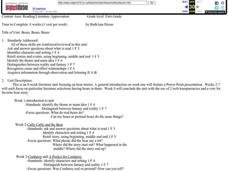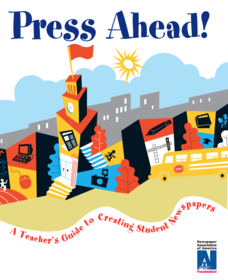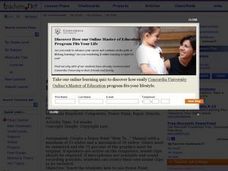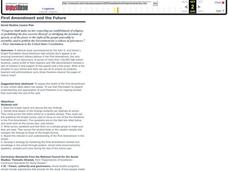Curated OER
Bears, Bears, Bears
First graders, after listening to the teacher read different bear stories, write their own bear story and vote for their favorite one in class.
Curated OER
Sense of Wonder,
Sixth graders engage in an activity in order to appreciate the wonders of the everyday world. They use an ordinary home to create context for the lesson. They realize seemingly mundane surroundings should spark a sense of wonder.
Newspaper Association of America
Press Ahead!
Give class members some great news! A media unit teaches individuals about ethics, parts of a newspaper, business writing, photojournalism, and more topics that have to do with the press. Full of material for a variety of learners,...
Curated OER
Welcome to Top Score: Verdi's 'Don Carlos'
Students study the elements in the production of an opera including the personalities, ideas, and stage presence. They examine the skills that are necessary to be a performer in an opera in this series of lessons including making...
Civil War Trust
Civil War Play
Raise the curtain to a class play that depicts the Civil War through both factual information and literary devices. The performance showcases the Battle of Antietam (Battle of Sharpsburg) and brings attention to women's roles,...
Curated OER
Civil War Play Lesson Plan
Students act out the Civil War through reader's theater. In this performing arts lesson, students research the Civil War and find costumes, props and scenery appropriate to the time period. They become characters from the Civil War time...
Curated OER
History is a Series of Decisions
Students examine cause and effect. In this American Revolution lesson, students analyze primary source documents regarding the Stamp Act, the Boston Massacre, and George Washington. Students imagine if the events had unfolded differently...
Curated OER
Faith-Based Initiatives: Separation of Church and State
Students examine the role of religion in everyday life. In this religion and ethics lesson, students investigate the use of government funds to support faith-based initiatives. The lesson calls for students to conduct research, watch...
Curated OER
Christmas Around the World
Students demonstrate an understanding of how different cultures celebrate Christmas by participating in artistic, musical, culinary and role play activities.
Curated OER
Writing and Creating with Power Point
Students explore the process of creating a Powerpoint presentation. They choose a "How to" topic, conduct research, organize their ideas, and develop and present their Powerpoint presentation.
Curated OER
Folktales around the World (Middle, Reading/Writing)
Students analyze, synthesize, and use the elements of various US cultural folk tales to describe the elements of fiction in general and in folk tales specifically.
Curated OER
Grandparents Day worry stones
Students copy their poem in their own handwriting to be included with the worry stone.
Teachers Network
A World of Symmetry: Math-Geometry
Define and identify the three basic forms of symmetry translation, rotation, and glides with your class. They cut out and arrange paper pattern blocks to illustrate symmetry, create a Cartesian graph, and design a rug with a symmetrical...
Curated OER
Noncombatancy and the Seventh day Adventist Church
Upper graders investigate how the Seventh Day Adventists are objectors to the practice of war. The instructional activity covers the Civil War and examines the church's position about the practice of war. The research extends to modern...
Curated OER
Learning Life Lessons through Fables
Explore a variety of fables to learn life's lessons through engaging stories. Add rigor to the learning process with activities that include matching a a fable to the story's moral, short answer exit slips, and a three-column graphic...
Curated OER
A Modest Proposal: Irony Made Understandable with Rock and Roll
Who doesn't love music? Poems and songs will engage your high school class in a discussion about irony. Use songs like "Rockin' in the Free World" or "Born in the U.S.A." to illustrate the ironic point of view. Print the lyrics so...
American Documentary
American Aloha: Hula Beyond Hawai'i
In this instructional activity, students will examine Hawaii's issues of colonization, authority, authenticity and cultural identity, and understand the distinction between native and non-native Hawaiians. This instructional activity...
Curated OER
Conservation and Environmental Protection
Students brainstorm a list of environments and animals from around the world that need protection. They then design and create a slogan about an animal or environment and an environmental protection poster.
Curated OER
Expressing Our Thoughts Through Poetry
Students create a poem on about spring. They read final version of their poem chorally. They write reflections of their experience in creating the poem.
Curated OER
First Amendment and the Future
Learners develop a strategy for furthering the First Amendment interest and knowledge in the school through posters, school-wide announcements, speakers, contests and more during the rest of the school year. Student research about free...
Curated OER
A Healthy Diet
Students examine their own fast food habits and discuss the poor nutritional value of this type of food. They read nutritional labels on popular packaged foods. They analyze the risks of a diet high in fat and sodium versus a well...
Curated OER
What's Behind that Mask?
Young scholars use a "spider web" graphic organizer to record information about different types of masks they are familiar with. They write a paragraph about masks. Students read about Native American cultures and compare/contrast the...
Curated OER
Teenage pregnancy trends in Canada
Young scholars analyze demographic data relating to teen pregnancy trends. They develop skills to locate and interpret data. They discuss the factors that influence teenage pregancy such as social, economic, and educational issues.
Curated OER
Effective Literary Analyses
Twelfth graders discuss a fictional text that they are given, they identify passages, which highlight the author's style, language naances and textual ambiguities. Pupils brainstorm possible topics for an analytical essay, they are...


